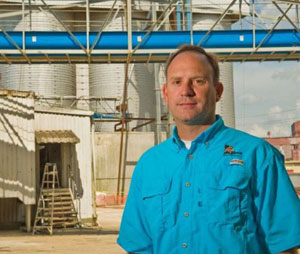U.S. rice millers and farmers are counting on Kenya’s United Nations-sanctioned plan to lead an international force to bring stability to Haiti — the largest foreign market for U.S. milled rice.
“After more than two years of near anarchy in much of Haiti, the U.N.-approved Kenyan police force will likely bring stability and order to the market,” USA Rice Federation spokesman Michael Klein told Agri-Pulse. “Securing the key ports of Port-au-Prince and Cap-Haïtien should allow U.S. rice exporters to more effectively deliver food to the Haitian people in 2024.”
U.S. exports of milled rice — about $200 million annually — are the most important source of food for besieged Haitians, but the gang violence that has escalated since the assassination of President Jovenel Moïse two years ago is threatening to cut off supplies. U.S. millers and Haitian importers are trying to adapt to the violence, but it’s getting more difficult as gangs tighten their control over ports and rob trucks full of rice.
U.S. exporters and importers are shifting delivery routes and spending more on security, but the gangs that rule Haiti keep making it more difficult to keep the country fed.
“Every Haitian eats rice on a daily basis and American rice is the most commonly available rice,” says Christine Coupet Jacques, who lives and works in Haiti as a conduit between U.S. exporters and domestic importers. “American rice is part of the daily meals of every Haitian household.”
But that could change.
The port in Haiti’s capital, Port-au-Prince, used to be the primary entrance to the country for U.S. rice, but U.S. exporters like Supreme Rice have had to shift much of their shipments further north to the more secure port in Cap-Haïtien.
 Bobby Hanks, Supreme Rice
Bobby Hanks, Supreme Rice“We do use (Port-au-Prince) for a very small quantity,” says Bobby Hanks, CEO of Louisiana-based Supreme Rice. “The risk is you have got to get it on a truck. You have got to get it to the warehouse without being stolen. So, you minimize your risk by reducing the volume.”
And that development has severely limited the ability to distribute to areas in the country that depend on shipments of U.S. rice. Previously, Supreme would send truckloads of rice from Port-au-Prince to its warehouse in the southwestern city of Les Cayes, but that’s no longer possible.
“The road that goes to Les Cayes from Port-au-Prince is totally controlled by gangs, so we essentially lost the ability to service that market, and people from the Les Cayes area are having to come to Port-au-Prince to try to buy basic necessities,” Hanks said.
And it is not as if Haiti can feed itself. The country is highly dependent on imports. Haitian farmers do grow rice, but not nearly enough, even under the best of circumstances. Poor weather conditions are taking a toll on the country’s rice farmers, but the primary growing region of Artibonite is suffering under gang violence.
Hundreds of gang-related kidnappings in Haiti so far this year have taken place in Artibonite, according to the U.N.
Artibonite takes up a major portion of the country and lies between Port-au-Prince and Cap-Haïtien to the north, where most U.S. rice shipments have been diverted.
It’s easy to be “in the know” about what’s happening in Washington, D.C. Sign up for a FREE month of Agri-Pulse news! Simply click here.
And if both Port-au-Prince and Cap-Haïtien become too dangerous to ship to, people will starve, said Hanks.
“It keeps me up at night, actually,” he said. “It's first and foremost a humanitarian crisis and our concern is the well-being of the people of Haiti. We've been selling rice to that country for years. … If we're unable to ship rice over there, people potentially will be starving. That's the number-one concern, but then there's also a story to tell about an impact on U.S. farms and their dependency on that market as well.”
For now, the U.S. is still exporting rice to Haiti, but it’s unclear how long that can continue without an overpowering force to bring peace and normalcy back to the island nation.
Jacques said she’s seen imports of most goods arriving in Haiti cut in half over the past two years, but that’s not the case for U.S. rice.
Kenya now has the support of the U.N. Security Council for its proposed Multinational Security Support mission, and then-Kenyan Foreign Affairs Minister Alfred Mutua told BBC News that the force could land in Haiti by Jan. 1.
Mutua was demoted last week, in part because of controversy over the plan to use the police in Haiti.
It’s unclear what the long-term impact will be of a decision this week by Kenya’s Supreme Court to put a hold on the mission until at least a hearing on Oct. 24. Former Kenyan presidential candidate Ekuru Aukot, who registered the complaint, said in a tweet that Haiti needs “an elected government. Not inexperienced police force to deal with super armed gangsters.”
But there is still widespread hope that Kenya will come through and “help secure critical infrastructure and transit hubs such as the airport, ports, schools, hospitals and key intersections,” according to the UN.
It was Haitian Prime Minister Ariel Henry who originally made a plea to the international community for help dealing with the gangs — consisting of 162 armed groups with 3,000 armed members. Isabel Salvador, Special Representative of the U.N. Secretary-General in Haiti, said at the U.N. that “the country will not emerge from the current security situation without strong international support for the Haitian National Police.”
But the Haitian populace is still divided, said Jacques. There is a nationalist attitude against intervention, but also stressed “you have people who are terrorized by the kidnappings, killings and rapes and they will take any help.”
For more news, go to Agri-Pulse.com.


